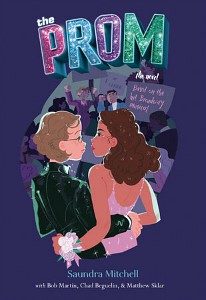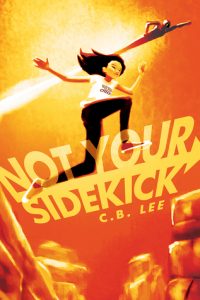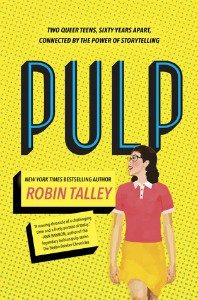
In October 2018, The Prom premiered on Broadway. It was a musical inspired by real events with a great deal of glitter thrown on top, and I was one of the people lucky enough to see the original cast on Broadway, because a good friend surprised me with tickets on my trip. The musical was fantastic, but sadly had a much shorter run than deserved, but it’s a book now, and we can all bask in its glory. The book is adapted from stage by Saundra Mitchell. Obviously the stage show has coloured my reading of the book, much like when you watch a film adaptation and you know all the bits they missed out. So I’m going to keep the comparisons vague to avoid spoilers, but I will still reference the show in my reading.
The story is set in Edgewater, Indiana, where our narrator Emma Nolan, informs us that it is a bad idea to be gay. Heads up, homophobia is a very presiding theme in this story, so if you are looking for a cute romance with no obstacles or politics, this may not be your read. Emma’s story preceding the book has been a difficult one, all too familiar to a lot of queer readers, but sadly a story that still must be told. The second narrator is Alyssa Greene, love interest, student body president, and perfect daughter to the overbearing leader of the PTA. The tension in the story all revolves around the fact that out and proud(ish) Emma would dearly like to go to prom with her closeted girlfriend. The PTA gets in the way, Broadway actors find out about the scandal and try to help. All hell breaks loose.
I’m torn over the structure of the book. On the one hand, I really enjoy swapping between Alyssa and Emma’s narratives, and this structure actually gives Alyssa a lot more agency and power than she has in the show. However, there are glimpses of scenes which exist on stage that they had to cut due to a lack of POV character, and are mentioned as asides, which make little sense. It’s a bit like only watching half of a crossover episode and wondering what you missed out on. The Prom is a nice short read, clocking in at just over two-hundred pages, so I think it might have made more sense to either expand to allow more points of view, or simply axe some of those asides altogether and focus on the main plot. The weirdest of these is perhaps that the book opens with reference to a broadway show flopping, and then doesn’t allude to this at all for about fifty pages. It makes a lot more sense by the end, but I personally think that the articles which serve as prologue and epilogue detract a little from the main narrative and are really only there for fans of the show.
The tone of the book is inescapably teenage highschooler. It’s a YA novel adaptation and it knows it. Pop culture references are abound, and if you aren’t up to date on your American High School slang (I am not), you might find yourself rereading a few sentences. But for the most part, I found the pop culture references hilarious and engaging. Emma’s narrative has a sarcastic and witty snap to it which is delightful to read even when things are going wrong. It also spans a decent range from memes, music, and tv, as well as inevitably a large number of broadway shows. This book genuinely made me laugh out loud on multiple occasions, and it’s chock full of genuinely wise quotes about homophobia, acceptance, and life in general.
(This bit is only about differences to the show, so if you aren’t already a fan, be ready for spoilers.) Firstly, there are some great little cast easter eggs in the names of the characters, some very obvious and some quite sneaky. The words of many (if not all) of the musical numbers have also made it into the writing one way or another, with several of them providing a lot of backbone to the plot, and others acting as throwaway lines which maybe don’t quite work. As I’ve already alluded to, the broadway characters don’t get a point of view. Dee Dee and Barry are still in it, but Trent and Angie have been axed entirely (despite the cast of Godspell still being present). Dee Dee really is turned into a caricature of what was already a largely than life character, but Barry somehow manages to retain depth and dignity, despite soaking up most of Trent’s role in the narrative.
Seeing the show and then reading the book definitely changed my reading of the book, and I’m very interested to know what others think who haven’t read it. From an adaptation standpoint, I thought it was a very cute read, with a lot of power, which overall took the narrative from a new angle and made sure we got more of the love interest’s side of the story. I would recommend this book highly to people who have seen or know the show, and and anyone who just wants a nice triumphant story about love against all odds.


